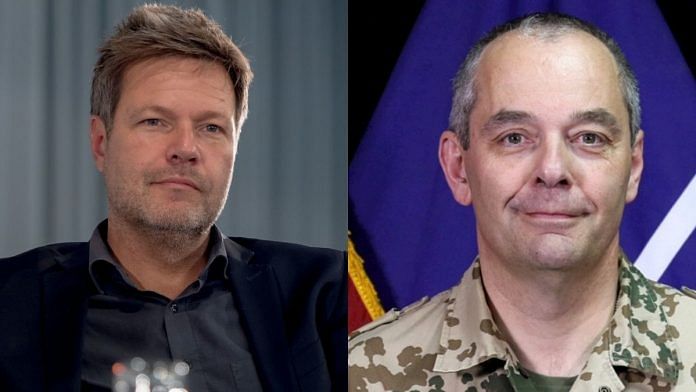New Delhi: As Russian troops knocked on the door of Ukraine capital Kyiv, German Army Chief Alfons Mais Thursday said his force was “more or less blank” is on offering any assistance to NATO, while German Vice Chancellor Robert Habeck admitted that the country was “reliant” on Russia for oil and gas.
Mais, who said he “never thought” he would experience another war, also added that military options the German army can offer to NATO were “extremely limited”.
‘That doesn’t feel good. I’m pissed’
On his LinkedIn page, Mais revealed that the Bundeswehr had celebrated a ‘Day of Values’ Wednesday but its central question of what they serve for had never been made as clear to the post-Cold War generation as the day of Russia’s invasion.
Elaborating on his surprise at experiencing another war, the 59-year-old also laid bare the depleted nature of the Bundeswehr today.
“The army that I am allowed to lead is more or less blank. The options we can offer policymakers to support the Alliance are extremely limited,” Mais said.
He also expressed his displeasure with Germany and the international community for failing to prevent the situation or learn from Russia’s annexation of Crimea in 2014. “That doesn’t feel good! I’m pissed!,” he lamented.
Mais stressed on the importance of “leaving the Afghanistan mission behind” and “repositioning” Germany to better serve its obligations to
NATO and other alliances in Europe.
‘Germany will not supply weapons to Ukraine’
In an interview with broadcaster ZDF, German Vice Chancellor Habeck, who is also the Federal Minister for Economic Affairs and Climate Protection, said it was imperative to reduce the country’s reliance on Russia for oil and gas.
“We cannot be so dependent on a country that does not respect international law,” he added.
According to Deutsche Welle, Habeck also told German public radio that the country would be able to satisfy its energy requirements even after completely cutting off Russia’s supply of gas.
Acknowledging that prices would skyrocket in the short term in such a scenario, Habeck committed to providing relief and compensation to consumers and businesses.
At a press conference in Berlin, the vice chancellor further reiterated that Germany will not be supplying weapons to Ukraine.
Russia’s invasion of Ukraine has plunged Germany’s energy situation into uncertainty and potential crisis.
According to The Guardian, approximately 25 per cent of Germany’s energy supply hinges on natural gas, of which 50 per cent is provided by Russia through the Nord Stream gas offshore pipeline.
The Nord Stream 2 project, which was intended to expand on the original pipeline and account for 70 per cent of Germany’s gas needs, currently stands suspended.
Hope everyone involved in closing German nuclear plants is very proud of the situation they've created https://t.co/IgE9HWF6EK
— Conor Duffy 🇮🇪🇺🇦 (@conorduffy_7) February 24, 2022
This comes amid Germany’s efforts to move away from other energy sources — it withdrew from developing nuclear power in 2011 and in 2019, committed to closing all coal-powered plants by 2038.
Also read: Chernobyl site shows increased gamma radiation levels after Russian siege



